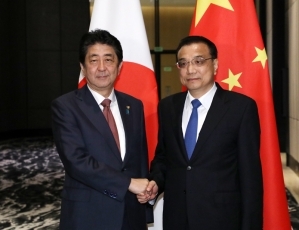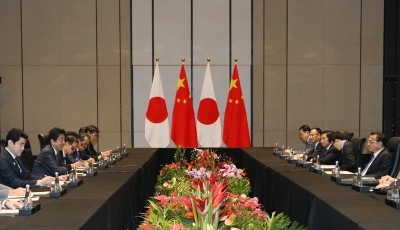Japan-China Relations
Japan-China Summit Meeting
November 13, 2017
 Photo: Cabinet Public Relations Office
Photo: Cabinet Public Relations Office
 Photo: Cabinet Public Relations Office
Photo: Cabinet Public Relations Office
On November 13, commencing at around 6:10 p.m. (around 7:10 p.m. Japan time) for approximately one hour, Mr. Shinzo Abe, who is visiting Manila, the Republic of the Philippines, to attend the ASEAN (Association of Southeast Asian Nations)-related Summit Meetings, held a Japan-China Summit Meeting with H.E. Dr. Li Keqiang, Premier of the State Council of the People’s Republic of China, at a hotel in Manila City. The overview of the meeting is as follows. (The meeting was attended on the Japanese side by Deputy Chief Cabinet Secretary Kotaro Nogami, Special Advisor to the Prime Minister Eiichi Hasegawa, Assistant Chief Cabinet Secretary Nobukatsu Kanehara, Deputy Minister for Foreign Affairs Takeo Akiba, and others; and on the Chinese side by Minister of Finance Xiao Jie, Vice Minister of Foreign Affairs Zhang Yesui, and others).
1 Beginning
(1) Premier Li congratulated Prime Minister Abe on his reappointment. The following is an overview of President Li’s comments.
- I am grateful to have the opportunity to meet again after more than a year. Currently positive changes are materializing in the relationship between the two countries. At the same time, it cannot be denied that some sensitive factors also exist, and there is a need for both sides to make efforts to solidify the momentum of improvement.
- This year is the 45th anniversary of the normalization of diplomatic relations between Japan and China, and next year is the 40th anniversary of the conclusion of the Treaty of Peace and Friendship between Japan and China. The fact that there is a Treaty of Peace and Friendship literally means that the two countries must advance their friendship and overcome difficulties.
- China hopes to make it possible for both countries to move forward by creating an atmosphere for heading in a positive direction with a spirit of “taking history as a mirror, and looking toward the future,” while meeting each other halfway, maintaining the momentum of improvement, and taking positive developments into account.
- I offer my congratulations on Premier Li’s reappointment as a member of the Politburo Standing Committee of the Communist Party of China.
- Looking ahead to the 40th anniversary of the conclusion of the Treaty of Peace and Friendship between Japan and China next year, I would like to join hands with Premier Li and vigorously pursue improvements in the relationship under the “Mutually Beneficial Relationship Based on Common Strategic Interests.”
2 Japan-China relations
(1) General remarks
- Both sides exchanged views on the way forward for improving the Japan-China relationship, bearing in mind Premier Li’s first visit to Japan as Premier on the occasion of the Japan-China-Republic of Korea (ROK) Trilateral Summit Meeting.
- Both sides shared the view that Japan and China now shoulder a major responsibility as countries that are indispensable to the stability and peace of the region and the world, and that the principle that “they are partners who cooperate together and are not threats to each other,” which is specified in the Joint Statement of 2008, should be solidly entrenched between the citizens of both countries.
- The two sides exchanged views on each other’s economic policies, including efforts with structural reform in China and Abenomics in Japan. In the course of that, Prime Minister Abe explained that China’s economic development is beneficial for Japan, and stated that he hopes the Chinese economy will develop in a stable and sustainable manner.
(2) Strengthening economic cooperation
- Both sides shared the view that Japan and China should cooperate with each other in order to deepen and expand their win-win economic relationship, and that developing Japanese and Chinese businesses in third countries will be beneficial not just to Japan and China but to the development of the countries concerned as well. They also shared the view that exchanges in the business community should be promoted.
- Both sides shared the view that they will discuss approaches for Japan and China to contribute to the stability and prosperity of the region and the world, including “the Belt and Road Initiatives.
- Both sides shared the view that they will strengthen coordination between the two countries in order to promptly conclude high quality agreements on the Regional Comprehensive Economic Partnership (RCEP) and the Japan-China-ROK Free Trade Agreement (FTA).
(3) Promoting people-to-people exchanges
- Prime Minister Abe also mentioned that Premier Li has visited Japan many times since the 1980s and has been making efforts with Japan-China youth exchanges, and the two sides shared the view that efforts should be made to deepen exchanges between their citizens, while passing this history of exchange on to the younger generations of both countries.
- The two sides shared the view that they will recommence the Inter-Governmental Consultation on Japan-China Cultural Exchange, with a view also to promoting cultural exchange and youth exchange in the “40th anniversary year” next year.
3 Regional affairs
(1) With regard to the North Korea issue, the two sides confirmed that the denuclearization of the Korean Peninsula is a shared goal of both Japan and China. Prime Minister Abe welcomed that China is implementing concrete measures in order to fulfill the United Nations Security Council (UNSC) resolutions, and the two sides shared the view that they will further deepen collaboration between Japan and China for regional peace and stability, including the complete fulfillment of the relevant UNSC resolutions.
(2) Prime Minister Abe explained that resolving the abductions issue as quickly as possible is a top priority for the Abe Cabinet, and explained that he hopes for China’s support and cooperation.
(3) Premier Li explained the progress with the dialogue on formulating a Code of Conduct (COC) on the South China Sea, and Prime Minister Abe welcomed that positive initiatives between China and ASEAN are progressing, while also pointing out that a free and open maritime order based on the rule of law is important in all regions.
(2) Prime Minister Abe explained that resolving the abductions issue as quickly as possible is a top priority for the Abe Cabinet, and explained that he hopes for China’s support and cooperation.
(3) Premier Li explained the progress with the dialogue on formulating a Code of Conduct (COC) on the South China Sea, and Prime Minister Abe welcomed that positive initiatives between China and ASEAN are progressing, while also pointing out that a free and open maritime order based on the rule of law is important in all regions.

